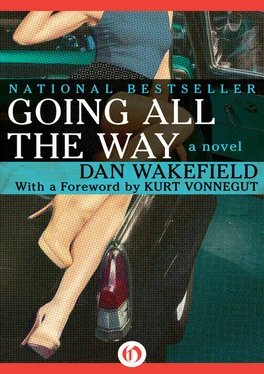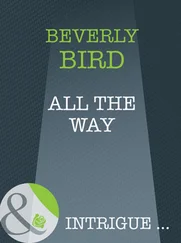He went to the sink and ran cold water on his wrist, then wrapped a lot of gauze around it and slapped big strips of adhesive tape over it, making a bulky, awkward bandage. He tiptoed to his room, closed the door, and had a cigarette. The windows were tinted with gray, the morning beginning to open and spread. Sonny was dog-tired but he didn’t want to sleep. He crawled into bed and stuck his wounded arm way down under the blanket so if his mother looked in she wouldn’t see. He wanted to get out of the house without running into his mother or father, but didn’t want to arouse suspicion by sneaking out before they got up. They’d be going to church. He waited it out until they woke and took their turns in the bathroom and scurried off in the half-conscious, helter-skelter manner in which they drove themselves into another day. They didn’t eat real breakfast; his mother would have Pepsi with ice, his father a cup of black coffee, each one standing as they poured down the individual fuel they required to begin.
When Sonny knew they were gone he quickly dressed, putting on some khakis and the satiny orange shirt with the sleeves that were too long—at last the baggy-sleeved shirt had a purpose; it would hide his bandage. He called Gunner at Marty’s, waking them both from their long night of lovemaking, telling Gunner that he had to meet him somewhere, quick, somewhere they could talk alone. Gunner said his mother had gone to church and was going to a picnic afterward, so they could go to the Meadowlark.
Gunner honked outside about ten minutes later. He hadn’t had time to shave and he looked gray and bleary. Sonny didn’t say anything and Gunner didn’t ask any questions. When they got to the apartment, Sonny said he needed a drink, and Gunner poured him a whiskey, straight.
“What is it, man?” Gunner asked gently. “What’s up?”
Sonny set his drink down on the coffee table, unbuttoned his left sleeve, and rolled it back, exposing the bandage. Gunner saw what it was, and he reached out and held Sonny’s hand, squeezing it hard. His eyes got that look of staring into an atom blast, and he started shaking his head and saying softly, “No, man, that’s not it, that’s not the way. It isn’t, man, it really isn’t. I tell you, no, it’s not.”
He stood up and started pacing back and forth, clutching his temple, saying, “We gotta do something, we gotta figure something out. We gotta get outa here.”
Sonny just sat and watched him, unable to speak or think.
Gunner suddenly stopped and made the pop of his fingers. “We’ll take off,” he said. “We’ll go on a trip. I gotta go to Chi sometime anyway, and we can stop at the lake. We’ll hit the road, get some fresh air, a little sun and water.”
“How?”
“I’ll get the car. I told Nina I had to borrow it sometime to go to Chi, and I’ll tell her I have to go now, the agency called me. We’ll get the hell out of here.”
“What’ll I tell my folks?” Sonny asked.
“Nothing. Anything. Leave a note. Say you’ll be back in a week, you went on a camping trip. They’re at church now, aren’t they?”
“Yes.”
Gunner hustled Sonny back down to the car and roared off to the Burns’ house. No one was there. Sonny sat down in the den, feeling dizzy, not sure what he was doing.
“Listen,” he said, “no shit, Gunner, what’ll I do?”
Gunner popped his fingers and pointed one at Sonny like a gun, and then, making it an order, he just said one emphatic, clear, irrefutable word, said it so there wasn’t any question or confusion:
“Pack!”
Sonny sat in the shade with a can of beer, trying not to be noticed. The hot bright life of the lake was playing out all around him, in the yard of the Beemer’s cottage and on the old white-painted wood pier that pointed out into the water. Chris-Crafts buzzed and bounced farther out, racing and riding or towing water-skiers; a couple of little kids shrieked and cried as they played with their buckets and shovels on the short strip of yellow-gray sand, and Gunner and the Beemer boys and some others cavorted all over the place in a game of keep-away with a beach ball, sometimes spilling the action over into the yard, up the steps of the cottage, across the road, anywhere. The only other stationary person except Sonny was Old Man Beemer, who sat in a big wooden lawn chair, sipping at a can of beer and grinning, occasionally shouting taunts or encouragement to the keep-away players, surveying the whole scene like some old, benevolent king. In a way that’s what he was, and the scene was his creation, the family cottage and the pier and the boat, all bought by the sweat of his enterprise, his charm, his continual long hours for so many years building up the business, expanding it from a single hole-in-the-wall bakery in a little side street in Broad Ripple to a main plant with huge expensive ovens and branch stores all over the city supplied by the spanking white trucks that bore the blue slogan “Beemer’s Is Better!” At just about the point that Old Man Beemer had brought this to its peak, had set up a flourishing business ready for his sons to take over and carry on in the best Beemer tradition, ready himself to sit back and reap a little fruit of his labor in the form of leisure and gardening and fishing and the fine new home he had built out in the swanky new Millbank section, at about this time he had his heart attack. He could still enjoy things, but he had to be careful, of course, had to really watch others enjoy what he had built, but that was in fact true reward for him, that’s what it all was for anyway. The Boys. And Ruth, of course. But mainly the Boys. So he sat every day of summer at the lake, in that same chair, as if he had been placed there, an old king set on his throne, holding for a scepter the glistening can of cold beer.
Sonny envied him in some weird way. At least it seemed like he was supposed to be there, was part of some pattern that made sense, had done things right and well and been paid off not just in money but in the two fine young boys who would carry on and do things right and well themselves and earn their own chair on the lawn someday. In one way it seemed kind of boring, like reading about the Life Cycle of the Hummingbird or something, but in another way it seemed safe and solid and secure and orderly in a way Sonny’s life was not at all. Mr. Beemer belonged in that chair, but what the hell was Sonny doing under that tree, on his lawn, trying to keep away from the sun and the happy sport of the lake? He had on his bathing suit because Gunner insisted. He said it was no use coming to the lake and sitting around in your street clothes, and Sonny argued that he couldn’t go around with his left wrist all bandaged up and no shirt sleeve to hide it (everyone knows what has happened if a person has his left wrist all bandaged up) and have to answer a lot of questions. But Gunner popped out the solution to that, running down to the general store and buying an ace bandage that he expertly wrapped and clamped securely on Sonny’s whole left forearm from wrist to just under the elbow, explaining that Sonny could say now he had a sprain. It was perfectly all right to have a sprain and an ace bandage—in fact, it was sort of a mark of honor, the sort of thing athletes were always having happen. It also gave him an excuse to not have to water-ski or anything too strenuous, or even go swimming, though he still could wade out from the sand where the kids played, edging into the water until it got up around his waist, holding his left arm up so the bandage wouldn’t get wet. He could also lie on the pier and “soak up some sun,” which Gunner, in fact, had made him do for several agonizing hours early that afternoon. He tried counting sheep, reciting to himself the Gettysburg Address, and going through his nursery rhymes, and that helped hold off the daymares but it also made his mind tired as hell.
Читать дальше












